THE WITNESS
Judge slaps Shs 37bn bill on lawyers
Published
7 years agoon
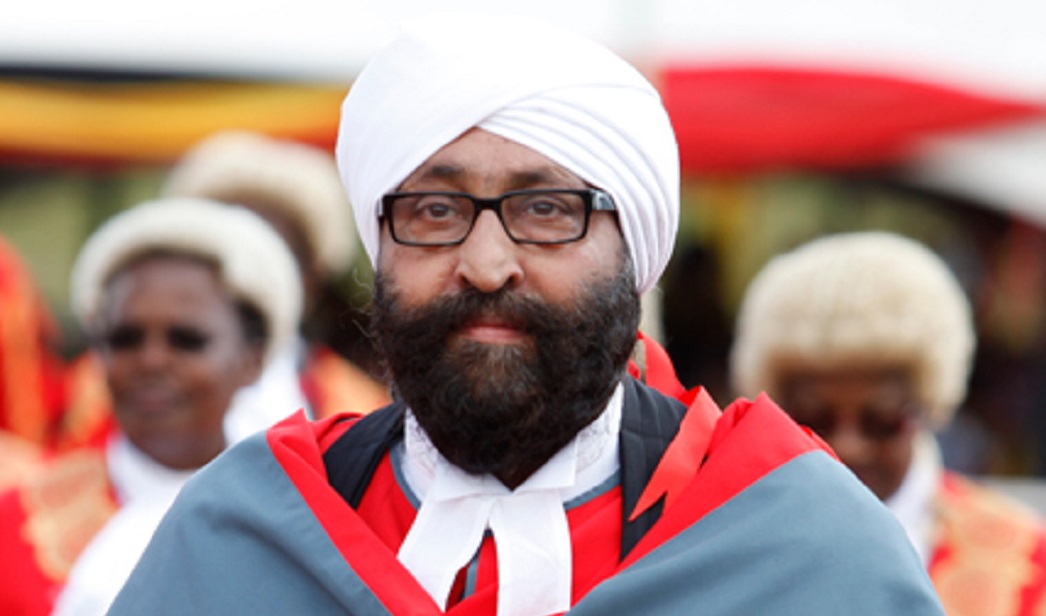
Written by Edris Kiggundu March 31, 2013
Uganda Law Society declares war on him
Justice Anup Singh Choudry has ordered two prominent lawyers to pay Shs 37 billion for allegedly being ‘dishonest’ in a case in which an investor evicted 410 tenants from a 11.6 square mile piece of land in Mubende to pave way for a coffee plantation and factory.
The ruling has shocked the legal fraternity and renewed the war between Justice Choudry and the Uganda Law Society, which has long called for him to be fired.
The judge said lawyers James Nangwala and Alex Rezida should pay the colossal figure as damages to the tenants for misadvising a government entity (Uganda Investment Authority) to purchase land that had encumbrances.
The duo is supposed to pay the money within 30 days from the date of the ruling and cannot appeal against the ruling unless they first deposit the full sum in court. The judge said this should serve as a lesson that ‘government cannot be an open cheque book for the negligence, fraud, dishonesty and theft of their lawyers.’
Nangwala and Rezida represented UIA, which identified the land for the investors, Neumann Kaffee Gruppe (NKG) of Hamburg, Germany, in August 2001. Choudry, in the March 28 ruling, 2013, said Nangwala and Rezida were grossly, recklessly and deliberately negligent in failing to complete the purchase of the land, contrary to the conditions in the sale agreement.
“They should have been more diligent because the overall quantum of the transaction including the compensation that was payable under the contract was in the region of billions of shillings; and the issue of compensation of tenants in the contract could not have been overlooked. They would have known full well the negligent implications of not concluding the terms of the sale agreement,” he said.
The figure, Choudry said, included Shs 3.8bn as special damages to the plaintiffs, Shs 1.1bn as disturbance allowance, Shs 2bn as general damages for the eviction of the plaintiffs, Shs 2bn as exemplary damages for oppressive and violent behaviour suffered by the tenants and Shs 1bn as damages in pain and suffering for the tenants.
This is in addition to Shs 27bn accrued as interest on all the above damages 10 years since the case was lodged in court.
If the lawyers cannot pay, Choudry said, the tenants may apply to the Law Society or Law Council to be paid from the compensation fund where a member of the public has suffered from the dishonesty of the lawyers.
But Nangwala, laughing, described the ruling as a set of ‘superfluous statements which have no meaning in law.’
He said they would not pay the money because the two parties to the suit were the tenants and government.
“He fabricated facts of his own,” Nangwala told The Observer on Saturday. “I can tell that it is a vindictive judgment meant to pay back those who stand by the decision of ULS to take him to court.”
ULS has petitioned the Judicial Service Commission, demanding that Justice Choudry be removed from the bench, citing improper conduct while he was practising law in the United Kingdom. The society also petitioned the Constitutional court over the matter, which is now before President Museveni. This has drawn a wedge between the judge and ULS, with some members vowing to boycott his court.
According to an email to members written by the newly elected ULS president, Ruth Sebatindira, and seen by The Observer, Choudry has crossed the ‘rubicon.’
ULS reacts
“An attack has been made on the Uganda Law Society which was not even a party to this suit in circumstances that suggest that the judge may be taking his wrath out on members of the bar who abide by the ULS position not to appear before him,” Sebatindira wrote a day after the ruling.
In April 2012, ULS requested President Museveni to set up a special tribunal to investigate allegations of improper conduct on the part of Choudry. According to documents filed in court in 2008 by ULS, Choudry was on October 31, 2000 convicted of making an excessive bill of costs amounting to £1 million (Shs 4 billion) in a libel case he was handling on behalf of a Sikh leader against the Sunday Times, a UK newspaper.
ULS says that Choudry was subsequently struck off the register of lawyers and solicitors from the United Kingdom and his law firm, Singh and Choudry, was closed down. Choudry denies the allegations which he has challenged in court. Bruce Kyerere, a former ULS president, described Choudry’s ruling as “the epitome of lunacy” and further evidence that he should not be a judge.
He said it was unconstitutional for the judge to demand that lawyers first deposit the entire amount in court before they can lodge an appeal.
“His continued presence on the bench is a disgrace to the judiciary,” Kyerere said.
Dramatic case
The controversial case was first lodged in 2002 by a group of tenants. However, judges it was allocated to kept rescheduling it. In 2009, with the support of a German NGO, FoodFirst Information and Action Network (FIAN), the tenants revived the case.
The tenants argued that NKG acquired the 11.6 square miles of contested land from UIA on a 99-year lease illegally. The land covered the villages of Keitemba, Luwunga, Kijunga and Kiryamakobe. They said that they were forcefully evicted from the land by soldiers from a nearby army barracks with the assistance of Mubende’s then Resident District Commissioner, Perez Katamba. In the process, they lost their property, livelihood, shelter and education.
They claimed that the compensation given was insufficient and not comparable to what they had lost. Choudry took over the case in 2009 and in the early stages Nangwala and Rezida asked him to disqualify himself because ULS had questioned his integrity. They also feared that being lead lawyers in the petition filed by ULS against Choudry, he might be biased against them.
But Choudry rubbished their worries and maintained that he would be impartial.
He said: “…my performance in the judiciary has been impeccable and I demonstrated exemplary behaviour in the past five years as a judge. I did not do anything wrong under our Constitution. In the past I also ruled in favour of clients who were represented by Nangwala and Rezida. I suspect there is some other motive why James Nangwala and Alex Rezida do not want to appear before a gray bearded judge in this case.”
The ruling
After three years of court arguments, Choudry ruled on March 28 that the tenants had been illegally evicted without being fully compensated. He instructed that they be paid damages, dating back 10 years, since they were evicted. Choudry faulted UIA for not carrying out due diligence, supervision and checks on the land.
He said: “… the whole transaction was suspicious. UIA failed to check land values and the compensation amounts payable.”
Choudry said the German investors, NKG, had a duty to ensure that people were not exploited. But he reserved the harshest criticism for Nangwala and Rezida, UIA’s lawyers.
“Messrs Nangwala and Rezida deliberately withheld information in breach of their fiduciary duty and this deliberate omission was a dishonest conduct. Nangwala and Rezida had forsaken their loyalty to the Leaser and Lessee in the grant of the lease, when to their knowledge the title was lumbered with encumbrances,” Choudry said.
ekiggundu@observer.ug
Related posts:
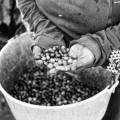
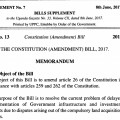 Land Bill: From Being a Custodian To an Owner?
Land Bill: From Being a Custodian To an Owner?
 A strategy to deny justice to communities facing illegal land evictions has been used since early 2000s.
A strategy to deny justice to communities facing illegal land evictions has been used since early 2000s.
 Court sets hearing date for social media shutdown lawsuit
Court sets hearing date for social media shutdown lawsuit
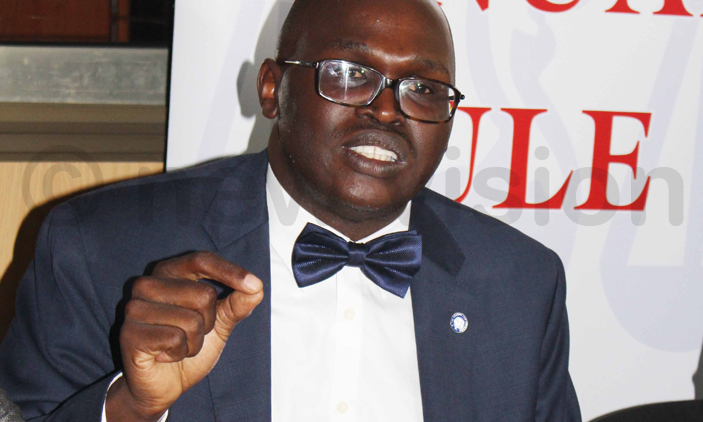 Ugandan Lawyers Find Government Directive To Use National ID To Verify Sim Card Ownership Illegal
Ugandan Lawyers Find Government Directive To Use National ID To Verify Sim Card Ownership Illegal
You may like
-


Six cattlemen opposed to the Tilenga oil project-related forced land eviction have been granted bail but will remain in prison…
-


Global agribusiness continues to displace rural communities
-


Court releases a tortured community land rights defender on bail
-


Breaking! Kiryandongo human rights situation is presented before the United Nations…
-


After being tortured by the army, the land rights defender is charged and remanded to prison
-
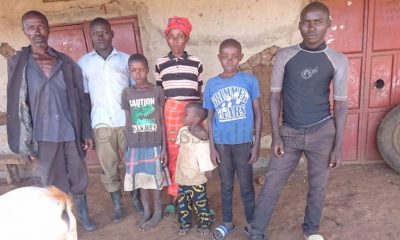

…….Special Report; abridged testimony……. ABDUCTION AND TORTURE: New methods used by multinationals and security agencies to grab land from the poor communities…
THE WITNESS
Enemies of the State: Resistance to the EACOP becomes a deadly task
Published
1 year agoon
July 3, 2024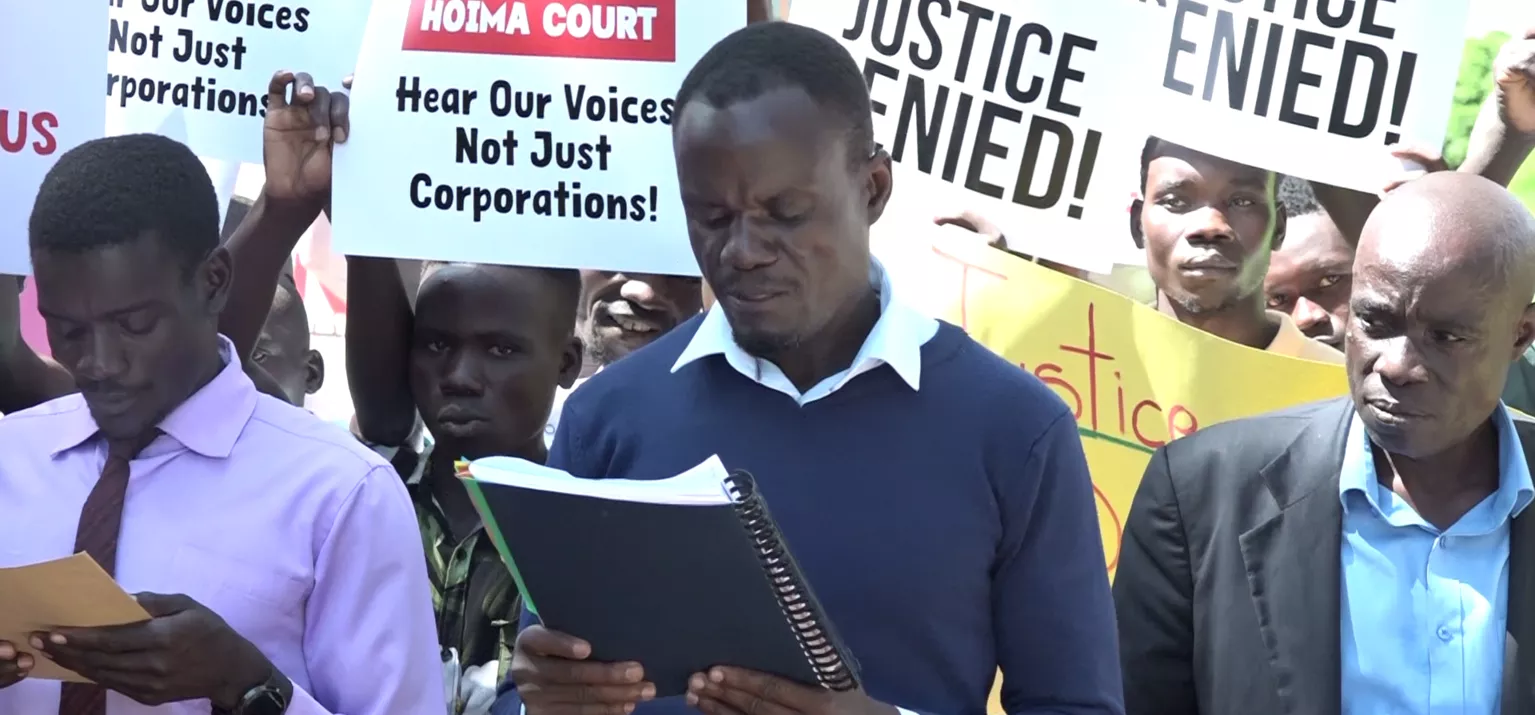
It is no secret: in Uganda it is badly about human rights. With the construction of the East African Crude Oil Pipeline, repression against lawyers, but activists and journalists is taking on new proportions. They are staged as enemies of the state. The human rights organisation Witness Radio reports from Uganda.
The morning of the 15th April 2024 in the court of the Ugandan city of Hoima did not go as usual: court officials, police officers and passers-by watched helplessly as a crowd led by the activist Fred Mwesigwa read a petition in the Hoima High Court: “We are deeply concerned about the recent court ruling that orders the expulsion of 42 families in the Buliisa district to make room for the Tilga project.” They protested against a court order of December 2023, which gave the government the green light to the community to expel the community for the oil production project. The community had previously refused to accept the government-intended compensation payments for their country, on which they live and from which they live.
The Buliisa case is just the tip of the iceberg of the many communities affected by oil production projects. In Uganda and Tanzania, the rural population in particular has to give way to a 30-metre-wide pipeline corridor, oil production fields, tank farms, infrastructure and safety zones around the East African Crude Oil Pipeline (EACOP). According to a study published in 2022 by the organisation Les Amis de la Terre, up to 118,000 people could be affected by resettlement along the pipeline route, including mainly farming communities.
Low discompensation
In a conversation with Witness Radio, those affected reported that they were no longer in a position to meet their basic needs due to insufficient compensation and inadequate resettlement plans. James 1, who was taken to the Kyakaboga resettlement camp, declared that the inhabitants had been provided with infertile land that was unsuitable for the cultivation of crops. In addition, the camps are overcrowded, which means that the residents are exposed to illness. He stressed that access to health services is particularly challenging. Pregnant women in particular are facing difficulties, as the nearest health centre is eight kilometres away. Tragically, James said, three pregnant womans would have lost their babies on their way to there.
“Their houses were set on fire, their ownness was plundered.”For the East African Crude Oil Pipeline, climate, nature and people need to give way
Uganda’s oil dilemmaControversies about the black gold
Black Gold from East AfricaConstruction of the EACOP crude oil pipeline is imminent
As in the case of the 42 households from Buliisa, who refused compensation from the government, many of the EACOP projects say those affected that the government did not adequately assess their land and property. Nevertheless, they were forced to release their land for the project. They criticised the fact that they were not sufficiently sensitised to the negative effects of the project. Instead, the government and the majority shareholders Totalenergies promised large compensation, prosperity growth and employment opportunities that have not yet occurred.
A study by Inclusive Development International also concludes that, in accordance with international standards, the government and TotalEnergies have systematically failed to involve the people affected by the project and civil society in the planning and providing them with low-threshold information. The study also states that when testing the environmental impact of Tilenga, Kingfisher and EACOP, it was found that the project promoters do not use the “best available techniques” to prevent the impact on the impact of ecosystems. The decision to use low-cost technologies for oil drilling and water-leading areas is therefore a predictable risk to the health and safety of local residents.
Opposition underesired
When the first land survey for the Tilenga project took place in 2020, many families expected to benefit from the project. Later, however, TotalEnergies aimed to acquire their country free of charge. In consultation with some real estate agents, local authorities, police and army, the company distributed almost 20,000 people in Kapapi (Hoima) in February 2023. In the course of this, women were also raped. Before the forced expulsion, the local police, in cooperation with the real estate brokers, had arrested those who criticised the land grab in order to intimidate the other members of the community.
Activists are presented as ‘anti-development’
The seven defenders of the plaintive families, Karongo Edward, Mulega Eria, Kataza Samuel, Rangira Stephen, Rubyogo Edward and Mbombo Stephen, were charged with a host of alleged crimes. In June 2023, after three to five months in prison, they were released on bail. However, as part of their bail pads, they must report regularly to the court in Hoima.
The criminalisation of land and environmentalists has become a common tactic by the Ugandan authorities in order to silence opposition and maintain impunity. This tactic does not only exist in Uganda, it is a global problem – especially in the context of large infrastructure projects.
According to the data from Witness Radio, in seven out of ten cases of evictions, defenders are subjected to targeted violence, torture and arbitrary arrests. They are often falsely charged with a large number of crimes ranging from domestic peace and attempted murder. At the end of June 2023, Witness Radio reported that more and more environmental and land-legal defenders who uncover questionable business are targeting state controls. From 2010 to 2023, more than 1,500 people. In connection with the pipeline, Witness Radio has documented 75 cases of arbitrary arrests, detentions and forced disappearances since the first construction work.
Opposition to the EACOP has become a mortal danger. Activists and human rights activists are confronted with hate speech, arrests, torture and death threats and are portrayed as ‘honsensible to development’ – on the grounds that they would promote the interests of Western countries.
The Resistance goes on
Ugandan activist Bob Barigye reports that the state security forces are using “false accusations” to arrest activists. “We are considered enemies of the state,” says Barigye. “The police are now preferting psychological torture because physical torture would create poor publicity for the oil pipeline project, which could deter investors and insurers. The government does not want to be in the international spotlight for the wrong reasons.”
Not only the project opponents, but also journalists in Uganda find it difficult to report on the EACOP projects: Gerald Tenywa is a Ugandan science journalist who has been reporting intensively on environmental protests for decades. In an interview with Drilled Media, he describes the difficulties in reporting on EACOP activists who criticise the construction of the pipeline. He cites the government’s intolerance to protests as a hurdle for journalistic work and stresses that in developing countries “oil and politics have almost always merged”.
“Oil and politics are almost always fused”
Emmanuel Okello works for the Uganda Radio Network in the Ugandan Albertine region. According to him, reporting is also made more difficult by the fact that the government and the companies involved keep the most important information about the oil projects under wraps. “A lot is claimed to promote these projects, including the development of the communities,” says Okello, “but this is not the case on the ground. People do not benefit from the projects, they only destroy their livelihoods. If you ask the government who exactly the beneficiaries they are talking about, there is no clear answer.”
It remains a difficult task to bring the voices of the affected communities into the public and to cope with the associated repression. It is also connected with obstacles to achieving justice through legal route. Thus, the court in Hoima rejected the application for the cessation of the evictions of the 42 families in Buliisa mentioned above.
The presentation of the plight of these communities, the protection of the environment and support for court cases are crucial, especially at a time when the space for civil society and media freedom in Uganda is becoming ever smaller. This requires cooperation with international groups and support for civil societies and media.
Source: www.iz3w.org
Related posts:

 The East African Court of Justice fixes the ruling date for a petition challenging the EACOP project.
The East African Court of Justice fixes the ruling date for a petition challenging the EACOP project.
 Put people above profits – Climate Activists urge Total to defund EACOP
Put people above profits – Climate Activists urge Total to defund EACOP
 Breaking: Criminal trial for seven community defenders opposed to EACOP/Tilenga project forced land eviction has been fixed.
Breaking: Criminal trial for seven community defenders opposed to EACOP/Tilenga project forced land eviction has been fixed.
 A reference filed by CSOs against the planned construction of the East African Crude Oil Pipeline (EACOP) is set for hearing.
A reference filed by CSOs against the planned construction of the East African Crude Oil Pipeline (EACOP) is set for hearing.
DEFENDING LAND AND ENVIRONMENTAL RIGHTS
Statement: The Energy Sector Strategy 2024–2028 Must Mark the End of the EBRD’s Support to Fossil Fuels
Published
2 years agoon
September 27, 2023
The European Bank for Reconstruction and Development (EBRD) is due to publish a new Energy Sector Strategy before the end of 2023. A total of 130 civil society organizations from over 40 countries have released a statement calling on the EBRD to end finance for all fossil fuels, including gas.
From 2018 to 2021, the EBRD invested EUR 2.9 billion in the fossil energy sector, with the majority of this support going to gas. This makes it the third biggest funder of fossil fuels among all multilateral development banks, behind the World Bank Group and the Islamic Development Bank.
The EBRD has already excluded coal and upstream oil and gas fields from its financing. The draft Energy Sector Strategy further excludes oil transportation and oil-fired electricity generation. However, the draft strategy would continue to allow some investment in new fossil gas pipelines and other transportation infrastructure, as well as gas power generation and heating.
In the statement, the civil society organizations point out that any new support to gas risks locking in outdated energy infrastructure in places that need investments in clean energy the most. At the same time, they highlight, ending support to fossil gas is necessary, not only for climate security, but also for ensuring energy security, since continued investment in gas exposes countries of operation to high and volatile energy prices that can have a severe impact on their ability to reach development targets. Moreover, they underscore that supporting new gas transportation infrastructure is not a solution to the current energy crisis, given that new infrastructure would not come online for several years, well after the crisis has passed.
The signatories of the statement call on the EBRD to amend the Energy Sector Strategy to
- fully exclude new investments in midstream and downstream gas projects;
- avoid loopholes involving the use of unproven or uneconomic technologies, as well as aspirational but meaningless mitigation measures such as “CCS-readiness”; and
- strengthen the requirements for financial intermediaries where the intended nature of the sub-transactions is not known to exclude fossil fuel finance across the entire value chain.
Source: iisd.org
Download the statement: https://www.iisd.org/system/files/2023-09/ngo-statement-on-energy-sector-strategy-2024-2028.pdf
Related posts:
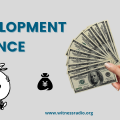
 Breaking: over 350,000 acres of land were grabbed during Witness Radio – Uganda’s seven months ban.
Breaking: over 350,000 acres of land were grabbed during Witness Radio – Uganda’s seven months ban.
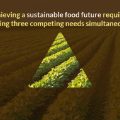 EBRD launches new agribusiness strategy
EBRD launches new agribusiness strategy
 30 civil society organizations have written to the World Bank Group demanding to publicly disclose the Africa Energy Approach paper.
30 civil society organizations have written to the World Bank Group demanding to publicly disclose the Africa Energy Approach paper.
 Over 600 million Africans lack electricity despite huge renewable energy potential
Over 600 million Africans lack electricity despite huge renewable energy potential
DEFENDING LAND AND ENVIRONMENTAL RIGHTS
Breaking: Three community land rights defenders from Kawaala have been arrested.
Published
3 years agoon
July 12, 2022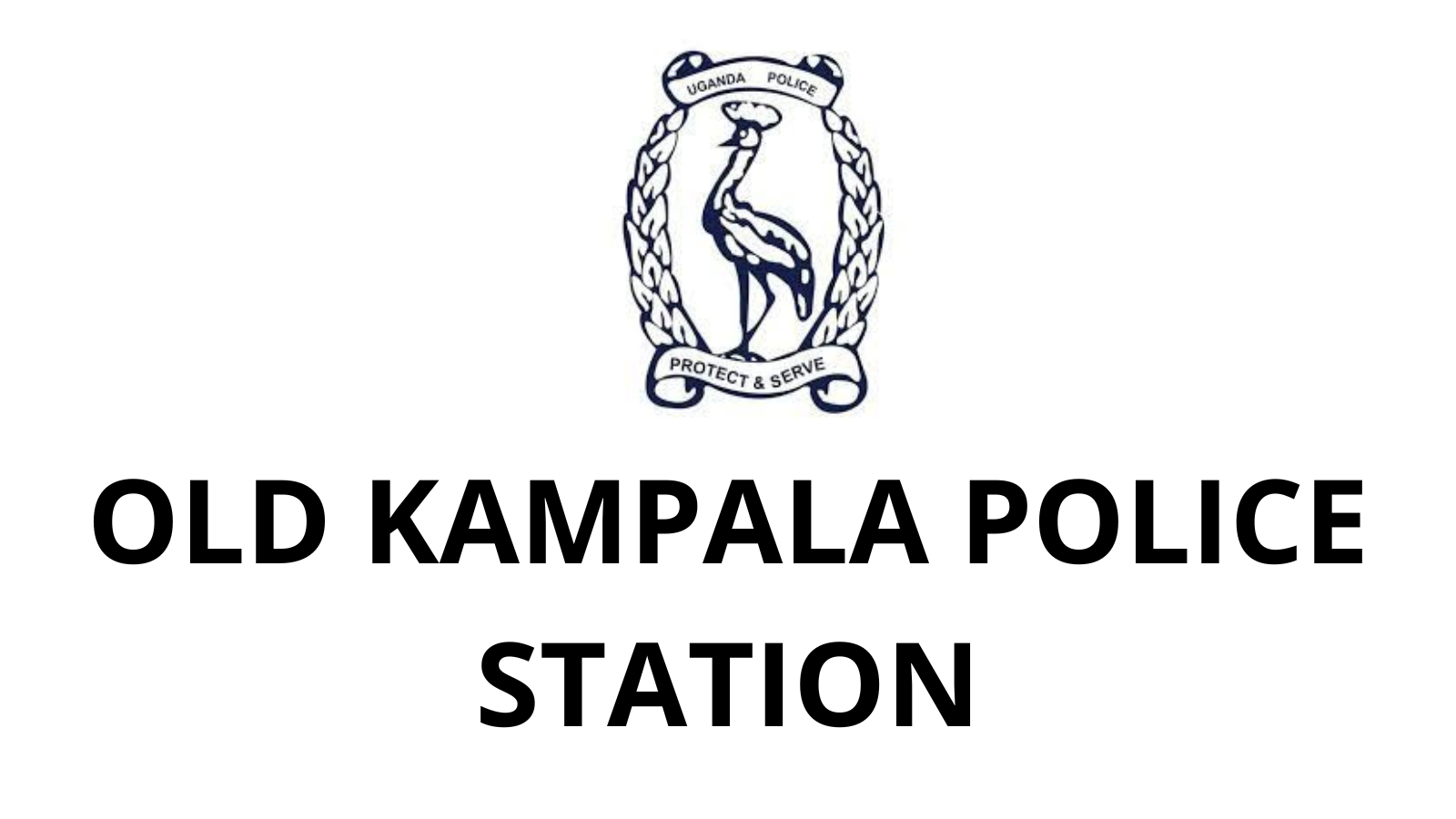
Breaking: Three community land rights defenders from Kawaala have been arrested.
By Witness Radio team
Police at Old Kampala Regional Police Headquarter have arrested three of the six community land rights defenders from Kawaala Zone II, Kampala suburb, and preferred a fraud charge before being released on bond.
Kasozi Paul, Busobolwa Adam, and Kabugo Micheal got arrested on their arrival before being taken inside interrogation rooms. They were questioned from 11:00 AM – 12:30 PM local time and later recorded their statements.
Section 342 of the Penal Code states that forgery is the making of a false document with the intent to defraud or deceive. It carries a three year imprisonment on conviction.
According to lawyers representing victims, defenders are arrested on the orders of the Deputy Resident City Commissioner (RCC) in charge of Rubaga Division Anderson Burora and accused them of fraud.
Resident City Commissioner is a representative of the president in the Capital City at the division level.
The charges are a result of continued resistance by Kawaala community seeking fair compensation and resettlement before Lubigi drainage channel is constructed. Since the first COVID outbreak in 2020, the victim defenders and others have been leading a pushback campaign to stop forced evictions by a multimillion dollars Kampala Institutional and Infrastructure Development Project (KIIDP-2) funded by World Bank. Kampala Capital City Authority (KCCA) is the implementor of the project.
This project first impacted Kawaala Zone II around 2014, when a channel diversion was constructed. The current planned expansion will widen that channel and require forced evictions across an area at least 70 meters wide and 2.5 km long.
The New Vision, a local daily of June 21st, 2022, quoted Burora accusing Kasozi Paul, one of the community land rights defenders from Kawaala Zone II of being a fraudster.
Witness Radio – Uganda challenges the deputy RCC Burora to produce evidence that pins the defenders on fraud instead of criminalizing the work of defenders.
“We warn Mr. Burora against using police to harass defenders who have openly opposed a project which is causing negative impacts on the community” Adong Sarah, one of the lawyers representing the defenders said.
The defenders got released on police bond as they are expected to report back to the police on Monday, the 18th of July 2022 at 11:00 AM local time.
Related posts:
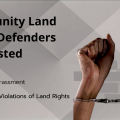
 Kawaala community land rights defenders will report for police bond for the fourth time on 1st August.
Kawaala community land rights defenders will report for police bond for the fourth time on 1st August.
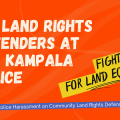 Six community land rights defenders from Kawaala have turned up at police for interrogations but, failed to take off
Six community land rights defenders from Kawaala have turned up at police for interrogations but, failed to take off
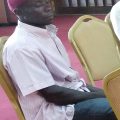 Breaking: Kawaala Community land rights defender has been kidnapped.
Breaking: Kawaala Community land rights defender has been kidnapped.
 Breaking: A Kawaala community land rights defender kidnapped and taken to unknown destinations, others on the run.
Breaking: A Kawaala community land rights defender kidnapped and taken to unknown destinations, others on the run.

Land Grabbing Crisis Escalates in Uganda: Mayiga Urges Citizens to Secure Land Documents

Seizing the Jubilee moment: Cancel the debt to unlock Africa’s clean energy future

Activism on Trial: Despite the increasing repressive measures, Uganda’s EACOP protesters are achieving unexpected victories in the country’s justice systems.

Communities Under Siege: New Report Reveals World Bank Failures in Safeguard Compliance and Human Rights Oversight in Tanzania

A decade of displacement: How Uganda’s Oil refinery victims are dying before realizing justice as EACOP secures financial backing to further significant environmental harm.

Govt launches Central Account for Busuulu to protect tenants from evictions

Activism on Trial: Despite the increasing repressive measures, Uganda’s EACOP protesters are achieving unexpected victories in the country’s justice systems.

Communities Under Siege: New Report Reveals World Bank Failures in Safeguard Compliance and Human Rights Oversight in Tanzania

Innovative Finance from Canada projects positive impact on local communities.
Over 5000 Indigenous Communities evicted in Kiryandongo District
Petition To Land Inquiry Commission Over Human Rights In Kiryandongo District
Invisible victims of Uganda Land Grabs
Resource Center
- LAND GRABS AT GUNPOINT REPORT IN KIRYANDONGO DISTRICT
- RESEARCH BRIEF -TOURISM POTENTIAL OF GREATER MASAKA -MARCH 2025
- The Mouila Declaration of the Informal Alliance against the Expansion of Industrial Monocultures
- FORCED LAND EVICTIONS IN UGANDA TRENDS RIGHTS OF DEFENDERS IMPACT AND CALL FOR ACTION
- 12 KEY DEMANDS FROM CSOS TO WORLD LEADERS AT THE OPENING OF COP16 IN SAUDI ARABIA
- PRESENDIANTIAL DIRECTIVE BANNING ALL LAND EVICTIONS IN UGANDA
- FROM LAND GRABBERS TO CARBON COWBOYS A NEW SCRAMBLE FOR COMMUNITY LANDS TAKES OFF
- African Faith Leaders Demand Reparations From The Gates Foundation.
Legal Framework
READ BY CATEGORY
Newsletter
Trending
-

 SPECIAL REPORTS AND PROJECTS7 days ago
SPECIAL REPORTS AND PROJECTS7 days agoActivism on Trial: Despite the increasing repressive measures, Uganda’s EACOP protesters are achieving unexpected victories in the country’s justice systems.
-

 NGO WORK2 weeks ago
NGO WORK2 weeks agoCommunities Under Siege: New Report Reveals World Bank Failures in Safeguard Compliance and Human Rights Oversight in Tanzania
-

 SPECIAL REPORTS AND PROJECTS3 days ago
SPECIAL REPORTS AND PROJECTS3 days agoSeizing the Jubilee moment: Cancel the debt to unlock Africa’s clean energy future
-

 MEDIA FOR CHANGE NETWORK3 days ago
MEDIA FOR CHANGE NETWORK3 days agoLand Grabbing Crisis Escalates in Uganda: Mayiga Urges Citizens to Secure Land Documents
